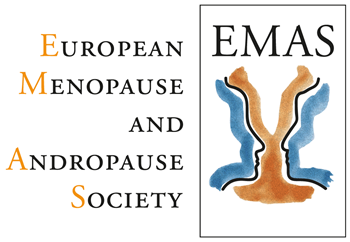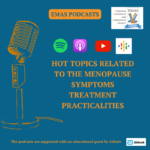Host: Welcome to today’s podcast. Practicalities: How to transition from oral contraceptives to menopausal hormone therapy. This episode is part of a podcast series supported by Abbott. The content is solely the responsibility of EMAS, the European Menopause and Andropause Society. All our episodes are available in English, Spanish, Mandarin, and Russian, and you can find them on any of the most popular podcast platforms.
In today’s episode, Nicolas Mendoza, Professor of Obstetrics and Gynecology at the University of Granada, Spain, current president of the Spanish Menopause Foundation and Board of the European Menopause and Andropause Society will help us understand the transition from oral contraceptives to menopausal hormone therapy.
Prof. Nicolas Mendoza: Good afternoon from Granada, Spain. In this podcast, we will discuss the transition from hormonal contraception to hormonal menopause therapy. Two fundamental possible scenarios can be drawn to the need for this transition between hormonal contraception and hormonal menopause therapy.
One is the woman who has been prescribed hormonal contraception as a treatment for premature ovarian insufficiency. The other possible scenario is the woman taking hormonal contraception as her usual method of contraception.
Let’s see the first. Hormonal contraception is used in some women with premature ovarian insufficiency as hormonal replacement therapy. There are several reasons for this. You have been prescribed to prevent spontaneous pregnancies which are described enough to 10% of these patients.
Another reason for the use of hormonal contraception in women with premature ovarian insufficiency, especially young women, is that it is less stigmatized than standard hormonal menopause therapy. In other words, if they are very young, they feel that they are doing the same as many other women with the same age who use hormonal methods for contraception.
In addition, it is quite possible that these women have opted for a clinical or cyclical hormonal formula that allows them to have regular bleeding and thus reinforces their feminity. In any case, the transition from one formula to another usually may, when the recommendation for the use of contraceptive method, in general, come to an aim that is around the age of 50 or 51.
For them, the transition is as simple as stopping hormonal formula and starting hormonal menopause therapy. It could be done immediately for these women who do not want to wait for vasomotor symptoms and who have been informed of the benefits of hormonal menopause therapy in the 10 years immediately after natural menopause, especially cardiovascular and bone, but also emotional and cognitive.
Let us not forget that we are treating women who have undergone a process that led to premature ovarian insufficiency. The formula for hormonal menopause therapy will be the one preferred by the user which may or may not be the same as that for hormonal contraception.
Fortunately, we have the same routes for administrating hormonal contraception and hormonal menopause therapy. The dosage and the preparations are smaller and more natural when it comes to hormonal menopause therapy.
Let’s see the second scenario, where hormonal contraception has been used as a male contraceptive method which to hormonal menopause therapy is intended. It is obvious that they will be done on a need basis. As there are no specific guidelines that may data based the recommendation, we will necessarily have to adapt to the characteristics of each woman requesting hormonal menopause therapy.
She may be requesting it because she has experienced bothersome menopause symptoms after cessation of hormonal contraception. She may be a woman who has been well informed about the window of opportunity, especially bone and cardiovascular, of using hormonal menopause therapy in the early years of menopause.
For these well-informed women, the way in which we use hormonal menopause therapy means that will be tied to these symptoms or needs.
As previously noted, we have different routes of administration and combination of estrogens and progestogen, both in hormonal contraception and in hormonal menopause therapy to offer women and they can decide which one best suit their characteristic and needs.
Host: Today, Professor Nicolas Mendoza discussed the indications and possible scenarios for the transition between the two types of hormone preparations. Thank you for listening to today’s episode. We hope it will be valuable for your clinical and research practice. Stay safe.
[END]


